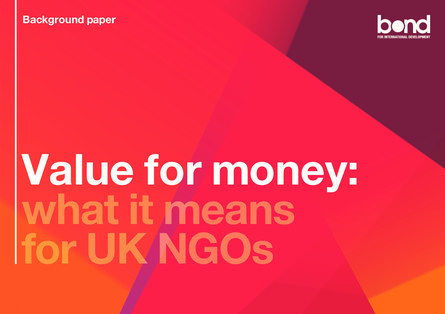
The concepts of value for money and results in international development are high on the political agenda and have emerged as priorities for many donor governments, including the UK and the Department for International Development (DFID). This donor focus is reflected in the outcome document of the 4th High Level Forum on Aid Effectiveness and is evidenced in the approach taken by donor governments in their assessment of both their bilateral and multilateral programmes as well as reporting requirements set for NGO grantees. Faced with increasing scepticism about aid and its impact, decreasing public and media support and acute fiscal constraints in many ‘traditional’ donor countries, the elevation of the results agenda and a focus on value for money should be seen as part of a genuine attempt by governments to challenge the ‘aid sceptics’ and demonstrate that aid is a good investment that yields significant results and a real impact on poverty reduction.1 However, these emerging themes are not without their challenges, in terms of both NGO practice and broader development policy and practice. There is a risk that both results and value for money will be interpreted and quantified in narrow terms, in ways that do not capture the complexity of development or appreciate the challenging and fragile contexts in which aid is and should be delivered. There is also a risk that the more qualitative aspects of development, such as empowerment, human rights, institutional reform and strengthening, will be viewed as too ‘high risk’ when subjected to a simple value for money evaluation. At the same time, there is an opportunity to see these new agendas, if framed and implemented in a nuanced way, as a real opportunity for NGOs as well as donor and recipient countries to critically assess and manage their development interventions to ensure that they deliver the maximum impact for people living in poverty. Although NGOs have considered these issues for many years, the recent political impetus creates a valuable opportunity for NGOs to positively and proactively shape and define these agendas, ensuring that approaches to value for money and results address the root causes of poverty and are defined in ways that will ensure inclusive and sustainable development. By proposing our own vision of value for money, NGOs can speak with a stronger collective voice and, in turn, will be positively placed to influence how donors and other development actors shape their approaches to these issues. This paper focuses on the practices of UK NGOs in engaging with value for money. Its goal is to support UK NGOs to explore the concept in the context of their work, identify ways in which they can improve the value for money of their activities and support their efforts to make a strong and defensible case to funders for their continued support to civil society. While the paper has been developed solely through discussions with UK NGOs, it is hoped that its contents will be of use to the wider civil society community.
